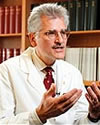
Dr. Chuck Czeisler
Brigham & Women’s Hospital
Dr. Czeisler is a certified sleep specialist of the American Board of Sleep Medicine and has 30 years of experience in the field of basic and applied research on the physiology of the human sleep cycle. He is Team Leader of the Human Performance Factors, Sleep and Chronobiology Team of NASA’s National Space Biomedical Research Institute and led the sleep experiment in which Senator John Glenn participated on the STS-95 space shuttle mission in 1998.
Dr. Czeisler received his undergraduate degree from Harvard College in biochemistry and molecular biology magna cum laude in 1974. Dr. Czeisler attended Stanford University, receiving his Ph.D. in Neuro- and Bio-behavioral Sciences in 1978 and his M.D. in 1981. Dr. Czeisler has published over 90 original reports in peer-reviewed journals and more than 75 review articles, as well as five books/monographs and numerous abstracts of research. He is a Fellow of the American Society for Clinical Investigation and the Association of American Physicians, and he has been a committee member on a number of government and national panels.
Dr. Czeisler’s scientific accomplishments in the field of chronobiology include:
1- the first demonstration of the synchronization of human circadian rhythms by light
2- the first demonstration that spontaneous sleep duration depends primarily on the phase of the circadian timing system, rather than on prior wakefulness
3- the first demonstration that application of circadian principles could improve the health and performance of shift workers
4- the design and development of a non-drug treatment for Delayed Sleep Phase Syndrome, caused by the misalignment of circadian phase with the patient’s desired sleep time
5- identification with others of the cluster of neurons in the human brain responsible for the generation of circadian rhythmicity in other mammals
6- the first demonstration that bright light could reset the human circadian pacemaker independent of the timing of the sleep-wake cycle
7- the first demonstration that properly timed exposure to bright light and darkness could effectively treat maladaptation to shift work
8- the first application of the bright light technology to facilitate adaptation to a night shift work schedule in an operational setting (NASA space shuttle astronauts)
9- characterization with others of the manner in which homeostatic sleep need and circadian sleep tendency interact to regulate alertness, cognitive performance and sleep in humans
10- demonstration that the period of the human circadian pacemaker is near 24 hours
Charles A. Czeisler, Ph.D., M.D. is a Professor of Medicine at Harvard Medical School; Chief, Division of Sleep Medicine, Department of Medicine at the Brigham and Women’s Hospital; Co-Director, Division of Sleep Medicine, Harvard Medical School; and an Affiliate Faculty Member in both the Program in Neuroscience at Harvard Medical School and the Health Science and Technology Program at Harvard Medical School/Massachusetts Institute of Technology.
